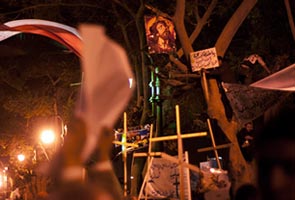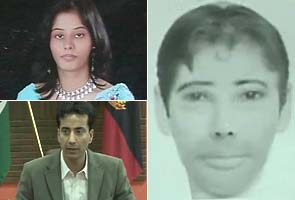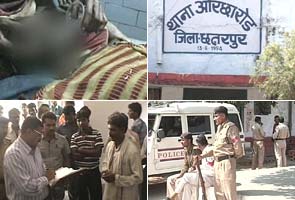
Cairo: Eleven people died in overnight fighting between Christians and Muslims in the suburbs of Cairo, the Health Ministry said on Wednesday, in the deadliest unrest since the ouster of President Hosni Mubarak last month.
The clashes broke out during a protest by several hundred Christians over the burning of a church in the village of Soul last week and raged into the early hours of Wednesday morning, adding to a sense of unease as the country begins to chart a post-Mubarak future.
The attack against the church in Soul is said to be the result of tensions surrounding an interfaith love affair.
The clashes that started Tuesday night were the most serious since Egypt's revolution, which was striking for the solidarity between people of different backgrounds, including religion and social class.
The violence posed a challenge to the country's military-led transitional government, which has made it a top priority to restore law and order.
Speaking on Al Jazeera television, the opposition figure George Ishaq appealed for an end to the violence. He called those participating in it "the real enemies of the revolution" and suggested they may be members of the former ruling party and its much feared State Security force.
The dead included six Christians and five Muslims, security sources said, all killed by gunshots. Around 100 people were injured in the fighting, which prompted the closing of a major Cairo highway and a wave of arson in the largely Christian slum of Mansheyet Nasr and the nearby neighborhood of Al Khalifa.
Witnesses say that the two sides hurled stones and Molotov cocktails and beat each other with clubs. Cairo ambulance service officials said they were unable to reach the scene because of gunfire.
"The army prevented us from entering," said Adel Azouz, chairman of the ambulance service. "The people who fought each other might have thought that our ambulances were there to offer support to the other side."
Military prosecutors began investigating the clashes on Wednesday, security sources said, questioning 15 people on charges of carrying guns and damaging cars and other property. The clashes began after demonstrators demanded that the transitional government rebuild the burned church, bring the perpetrators to justice and publicly pledge to improve the condition of Egypt's Christians. The neighborhood where the clashes erupted is home to many of the so-called zabaleen, the city's impoverished mostly Christian garbage collectors, who for ply their trade on donkey carts or tiny mechanized trucks.
Several thousand Christians have demonstrated in front of Egypt's state television headquarters for the past three days to voice similar demands.
The mood in front of the state television was angry and aggrieved.
"We are being persecuted and killed here by Muslims," said Bishoi Edmund, 24, a protester from the largely Christian neighborhood of Shoubra.
"We need international protection," he said. Mr. Edmund and others cite a long list of grievances, including the still-unsolved bombing of an Alexandria church on New Year's Eve that killed 23 people.
Following that attack, Cairo was rocked by several days of rioting between Christian protesters and the police. Egypt has long wrestled with sectarian tension between Muslims and Christians, who make up about 10 percent of the population and complain of widespread prejudice.
The clashes broke out during a protest by several hundred Christians over the burning of a church in the village of Soul last week and raged into the early hours of Wednesday morning, adding to a sense of unease as the country begins to chart a post-Mubarak future.
The attack against the church in Soul is said to be the result of tensions surrounding an interfaith love affair.
The clashes that started Tuesday night were the most serious since Egypt's revolution, which was striking for the solidarity between people of different backgrounds, including religion and social class.
The violence posed a challenge to the country's military-led transitional government, which has made it a top priority to restore law and order.
Speaking on Al Jazeera television, the opposition figure George Ishaq appealed for an end to the violence. He called those participating in it "the real enemies of the revolution" and suggested they may be members of the former ruling party and its much feared State Security force.
The dead included six Christians and five Muslims, security sources said, all killed by gunshots. Around 100 people were injured in the fighting, which prompted the closing of a major Cairo highway and a wave of arson in the largely Christian slum of Mansheyet Nasr and the nearby neighborhood of Al Khalifa.
Witnesses say that the two sides hurled stones and Molotov cocktails and beat each other with clubs. Cairo ambulance service officials said they were unable to reach the scene because of gunfire.
"The army prevented us from entering," said Adel Azouz, chairman of the ambulance service. "The people who fought each other might have thought that our ambulances were there to offer support to the other side."
Military prosecutors began investigating the clashes on Wednesday, security sources said, questioning 15 people on charges of carrying guns and damaging cars and other property. The clashes began after demonstrators demanded that the transitional government rebuild the burned church, bring the perpetrators to justice and publicly pledge to improve the condition of Egypt's Christians. The neighborhood where the clashes erupted is home to many of the so-called zabaleen, the city's impoverished mostly Christian garbage collectors, who for ply their trade on donkey carts or tiny mechanized trucks.
Several thousand Christians have demonstrated in front of Egypt's state television headquarters for the past three days to voice similar demands.
The mood in front of the state television was angry and aggrieved.
"We are being persecuted and killed here by Muslims," said Bishoi Edmund, 24, a protester from the largely Christian neighborhood of Shoubra.
"We need international protection," he said. Mr. Edmund and others cite a long list of grievances, including the still-unsolved bombing of an Alexandria church on New Year's Eve that killed 23 people.
Following that attack, Cairo was rocked by several days of rioting between Christian protesters and the police. Egypt has long wrestled with sectarian tension between Muslims and Christians, who make up about 10 percent of the population and complain of widespread prejudice.

 Click to Expand & Play
Click to Expand & Play